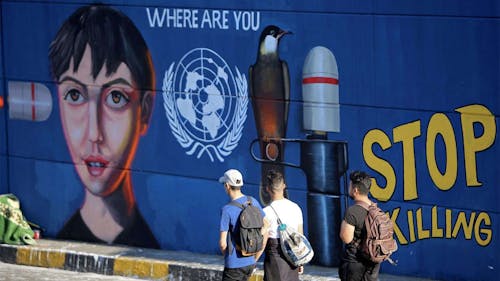'Invaded,' 'occupied,' 'displaced': Rutgers—Newark panel discusses consequences of US invading Iraq 20 years later

On October 23, citizens of Iraq and the U.S., scholars and musicians gathered on the Rutgers—Newark campus to share art and their perspectives on the U.S. invasion of Iraq 20 years ago and the resulting war and occupation.
For some who gathered at Ruth Bader Ginsburg Hall on the Newark campus, the war was a brutal eight-year campaign and a dehumanizing occupation. Multiple panelists compared it to the current Israel-Hamas war.
"Emotions are the first form of enhanced action," said Zahra Ali, an assistant professor in the Department of Sociology and Anthropology. "We have to use them, channel them, to push us and our students to seek knowledge."
Rutgers School of Arts and Sciences hosted the nearly full-day event entitled "Iraq: Twenty years after the U.S. Invasion and Occupation" to discuss different viewpoints on the war. The day featured a concert by Amir ElSaffar's Two Rivers Ensemble and a poetry reading by Iraqi-American poet and writer Dunya Mikhail.
The event also featured Wazhmah Osman, an Afghan-American filmmaker and associate professor at Temple University, Zainab Bahrani, a professor and chair of the Department of Art History and Archaeology at Columbia University, Omar Dewachi, an associate professor in the Department of Anthropology, and Jack Tchen, director of the Clement Price Institute on Ethnicity, Culture & the Modern Experience.
The Global War on Terror began after the September 11 attacks when the U.S., led by former President George W. Bush, set out to suppress and prevent further terrorist attacks from the Middle East.
This 20-year-long operation directly led to the death of nearly one million people. Another 4.5 million have been indirectly killed in war zones, and another 38 million people were displaced from their homes, Ali said.
She drew parallels between the Iraq War and the current conflict in Israel and Palestine. Many people are feeling today the way they did 20 years ago when the Iraq invasion first happened, she said.
"When we explain what has happened in the last two weeks in Israel and Palestine, also explain that it did not start on October 7, but that it has to be understood in the broader history of 75 years of settler colonialism, dispossession, misplacement and the erasure of the Palestinian people," Ali said.
Some of the panelists were in Iraq during the war, while others were in the U.S., but all the speakers said they felt the impacts of the invasion. A major theme of the discussion was the "us against them" mentality during the time. The panelists described how they felt as an Iraqi citizen or an American citizen at the time.
"(Iraqi) people were told repeatedly, 'You don't belong here, you're not real Americans, you're either with us and with the war and the invasion, or you're with the terrorists,'" Bahrani said.
Osman said people expressed empathy with the Iraqi people but didn't practice it.
"We have to connect. We have to be empathetic to each other's humanity and not think against one another," said Osman.
Osman explained that this lack of empathy is due to the lack of humanization of both sides of a war or conflict.
"Many of the stories don't show the harm to the people on both sides, the people who are being bombed and people who are part of being the perpetrators … there's no critique of the system at large," Osman said.
The speakers said American journalists made the war seem like a necessary evil and dehumanized the occupation and that there was no accountability on the U.S.'s side.
"The way the media was jumping for these wars and kind of burying this misinformation across, it was a failure of any international humanitarian law," Dewachi said.
The panel also talked about how little the American people knew about Iraq before and even during the war. ElSaffar said the average American did not know how many people died in Iraq, saying some estimates of thousands of deaths were due to how foreign the war was made to be back home.
"They don't know," ElSaffar said. "People don't know what language is spoken in Iraq. People don't know very, very basic things about Iraq. I don't know if people can find it on a map. And yet, the U.S.'s impact over the past 30 years has been tremendous and mostly devastating."



